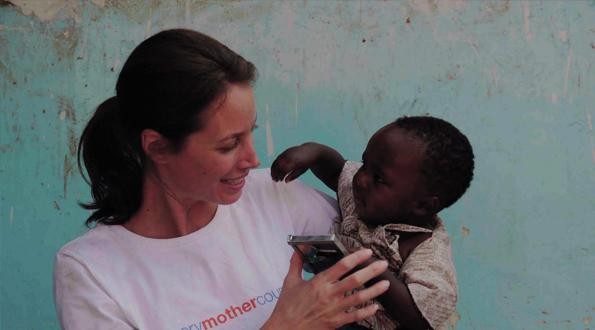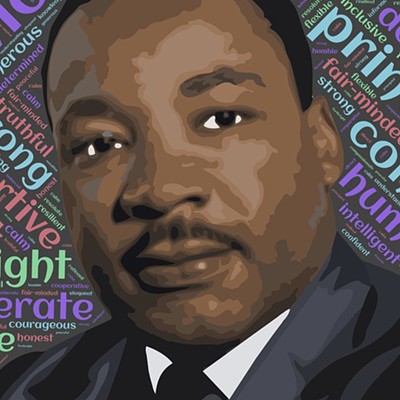When Christy Turlington Burns began to bleed excessively after giving birth to her first child, her life was saved by her midwives and doctors.
She discovered afterwards that not every woman is so blessed: A thousand women a day die in childbirth worldwide, deaths that can be prevented when those women have access to quality reproductive care.
To raise awareness, the former supermodel–turned–film director traveled around the globe collecting stories of women about to give birth and those who work with them. Perhaps the most telling footage was taken in the U.S., where one in five pregnant women has no access to prenatal healthcare—resulting in a 50th place ranking in birth mortality rates.
Burns’ documentary, No Woman, No Cry, premiered at the Tribeca Film Festival in 2010. In conjunction with her non–profit Every Mother Counts, she continues to educate audiences around the world about the need for healthcare access for all women.
Turlington Burns took time to answer questions for Connect from New York City where she lives with her husband, film director Ed Burns, and their two children. She will be in town to discuss her film after it screens at the Savannah Film Festival Monday, Oct. 29.
One of the themes throughout the film is that birth is a universal experience for women no matter where they live. What are the specific barriers to prenatal care and reproductive education for each of the women you profiled?
Christy Turlington Burns: The five barriers to care that pregnant women commonly face are access to prenatal care, access to emergency obstetric care, the improvement of postpartum care, the strengthening of healthcare policies and access to family planning education.
How have circumstances changed in the arena of women’s reproductive healthcare since the film premiered?
Christy Turlington Burns: There have been improvements in each of the countries we filmed in—though there is still much to be done.
In Bangladesh, maternal mortality rates have dropped 40 percent since 2000. In Guatemala, there have been policy changes around reproductive rights, most notably the passage of the Healthy Motherhood Law which recognizes the Guatemalan government’s obligation to address the country’s high rate of maternal death. It guarantees universal access to “high quality, culturally appropriate and free” obstetrical care—including emergencies—and requires that the Ministry of Health set aside sufficient funds for it.
Political will remains strong in Tanzania with the re–election of President Jakaya Kikwete, who has set a shining example for other African countries in his leadership on both maternal and newborn health.
In the U.S., the Affordable Healthcare Act has been implemented, providing guaranteed coverage for preventative care visits, contraception, domestic violence screenings and screenings for gestational diabetes and other services that can reduce the risk of maternal mortality.
Women’s healthcare is a tremendous issue in American politics this election. What policies would you like to see enacted?
Christy Turlington Burns: What is happening here in the U.S. around reproductive rights has certainly made this past year quite interesting.
When I screen No Woman, No Cry around the world, people are most shocked by the U.S. statistics: The fact that [for life expectancy at birth] we are ranked 50th world yet we spend more on healthcare per capita than any other nation just doesn’t add up.
Women and families should not pay the unfair price of risking their lives while to birth in this country. Every woman is entitled to comprehensive information and services. Every pregnant woman should have access to quality maternity care.
Do you consider this a feminist issue? An economic one?
Christy Turlington Burns: This is a complicated global issue that has many layers, some of which will appeal to feminists and economists. Who it really should appeal to are humanists.
Every Mother Counts stresses that keeping the world’s mothers healthy is an issue that affects us all. Healthy mothers make healthier babies, and when we choose motherhood, our families are more likely to thrive. It’s as simple as that.
What actions can be taken to save women’s lives outside of government?
Christy Turlington Burns: Many reduce these issues to political discourse. Women’s rights are often used to divide people when maternal health should be a unifying topic. This is so more than just a political issue. This is why Every Mother Counts seeks to engage new audiences and educate as many people as possible about the challenges AND solutions. We encourage everyone to take action and use their voice to help improve the lives of moms and their families worldwide.
Women have begun to eschew the “medicalization” of birth and return to the intrinsic wisdom of doulas, natural childbirth, squatting during labor, etc. How can women all over the world remain empowered during the birth process while holding the possibility that they may need medical intervention?
Christy Turlington Burns: I was lucky to have had so many birth options to choose from, and I would say that the birth center is an ideal option for those of us who believe in physiological birth but understand that complications can present in any one of us at any time. So being close to emergency obstetric care is quite critical.
In the U.S., maternal death rates are on the rise and over–medicalization is one reason for the growing numbers of mortality that we are seeing.
However, Robbie [a widower profiled in the film] and his wife, Susan, were in a hospital when she died from an amniotic fluid embolism. AFE is one of the few causes of maternal death that is rarely preventable or survivable, but I wanted to add the voice of someone who had recently lost a loved one who could articulate what that feels like. It’s difficult for me to watch that footage every time, but I am always grateful for his courage to share their story.
How does Every Mother Counts bring education and healthcare to women around the globe?
Christy Turlington Burns: Every Mother Counts is always looking for new opportunities to educate not just women, but everyone around the world, about maternal health. There’s a lot on our website, everymothercounts.org.
No Woman, No Cry continues to be screened frequently after two and a half years, which helps to humanize this issue for people. We continue to find ways to invite participation amongst everyday citizens who want to make a difference in the lives of girls and women.
We have collaborated with a number of likeminded brands to raise awareness and funds that will benefit maternal health programs around the world. Most recently, we launched a partnership with Ergo Baby, where I guest–designed a small collection, from which proceeds will benefit EMC.
We are also currently training for the ING New York City Marathon for the second year in a row and have invited others to join us in solidarity on Nov. 4th by walking or running 5K—the minimum distance a woman may have to walk to access basic maternity care.
Any plans for a next film?
Christy Turlington Burns: I have some ideas, but it had taken me this long to muster up the energy to prepare for a next project. Documentaries are like children: It’s a big jump to go from one to two.
No Woman, No Cry (followed by Director Q&A) screens Monday, Oct. 29 at 11:30 a.m. at the Lucas Theatre


























